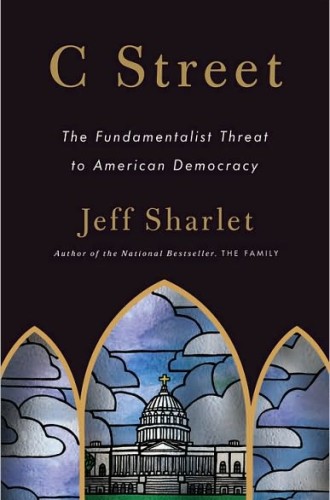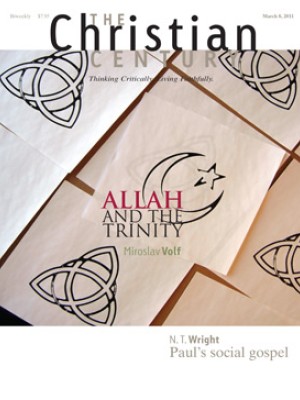C Street, by Jeff Sharlet
In his best-selling 2008 book, The Family, Jeff Sharlet probed the sprawling but mostly secretive work of a longstanding Christian outreach to political leaders in the United States and, increasingly, around the world. The Family, better known as the Fellowship, surfaces each year as sponsor of the National Prayer Breakfast. Sharlet sees the group not merely as a promoter of vapid civil religion, but as "a threat to American democracy." Now he is doubling down on his thesis.
Sharlet's new evidence begins with C Street House, a Capitol Hill townhouse associated with the Family, where congressmen (the residents are all men) enjoy Christian fellowship along with low rent. C Street made headlines in 2009 when it was revealed that two residents, Nevada senator John Ensign and Mississippi representative Chip Pickering, had had extramarital affairs. Meanwhile, South Carolina governor Mark Sanford noted his C Street ties after returning from a visit to his "dear friend from Argentina." The other C Streeters did not approve of these transgressions, but neither did they call for impeachment hearings.
Read our latest issue or browse back issues.
At the ethically ambiguous place where prayer groups and political interests intersect, Sharlet sees the logic of the Family at work. Its outreach to the powers that be depends on the redemption of political authority. Here King David is a role model in all respects, right down to his affair with Bathsheba. The emperor might occasionally lose his clothes, but he must never lose his throne. Sharlet assails "the alchemy by which men elected by citizens persuade themselves that they were, in fact, selected by God." That is the driving dynamic behind what Sharlet identifies as Family-style fundamentalism, with its paternalistic "conflation of democracy with authoritarianism."
There certainly is something creepy about the C Street club. But is creepiness a threat to democracy? Oklahoma senator Tom Coburn, whom Sharlet calls "the conscience of the Christian Right," likely would force congressional staffers to watch his graphic antipromiscuity slide show even if he didn't live at the C Street House.
If you did not like The Family, you likely will loathe this book. Sharlet's weaknesses are on full display. He adopts a supply-side approach to both reportage and analysis, as if seeking to apply E. M. Forster's motto "only connect!" to every anecdote. The result is a sprawling, choppy book powered by capacious research, intrepid journalism, pointed turns of phrase and even more pointed opinions. Those (not insignificant) issues aside, Sharlet is too skilled a journalist and too intelligent a writer to be dismissed as a conspiracy theorist. The issues he addresses should be of concern to Christians and all lovers of democracy.
Indeed, his other case studies are infinitely more disturbing than the antics of the boys on C Street. Sharlet interviews a Family protégé in Uganda who introduced the bill that would make "aggravated homosexuality" a capital offense and require all citizens to report homosexuals in their midst. And turning to the U.S. military, Sharlet finds an evangelical power base that, while not directly connected to the Family, shares its embrace of a power-loving Jesus.
The deeply homophobic Ugandan leaders Sharlet profiles come across as evangelical mimic men, acting out an illiberal agenda that has the implicit endorsement of their patrons back in the States. Sharlet goes too far here; the horrific bill has never come up for a vote, and more than a few Family spokespersons have criticized it. Still, one need not view Rick Warren (who famously desires to turn Rwanda into "the first purpose-driven nation") as a stealth neoliberal to have a cynical take on why so many conservative U.S. evangelicals suddenly sound like born-again third worlders.
Sharlet's portrait of warrior fundamentalists within the military's chaplaincy program and officer corps is similarly disturbing. Again, he overinterprets to the point of inconsistency: the "evangelical transformation of the military" has featured both a "quiet coup" and a "subtle civil war over its own soul." Still, readers will come away fully aware of the downside of the post-Vietnam, postconscription armed forces. The military may be, in the words of one soldier, "the easiest place in America to be a Christian." Yet it is increasingly distant from the restraints of American democracy.
American democracy is Sharlet's primary concern, even though (as in his first book) he gets in quite a few jabs at the Family's obvious theological vacuity. "If Jesus were to have adopted the philosophy of the Family," he quotes a critic as saying, "he would have been working with Herod, and he would have taken Pontius Pilate to lunch." Sharlet believes that pluralism needs the shelter of secular democracy. He sees a role for Christian faith in politics—just not a custodial role. He wants Christian citizens to be "part of the noise."
In one of his many asides, Sharlet recalls the spontaneous popular responses to Michael Jackson's death, when "mourners thumped the beat of pop democracy, Walt Whitman you could dance to." That's Sharlet's preferred brand of civic faith, and the countervailing King David complex of C Street drives his outrage, periodically to the point of hyperbole. You do not need to share all of Sharlet's interpretations, however, to learn from his findings.







